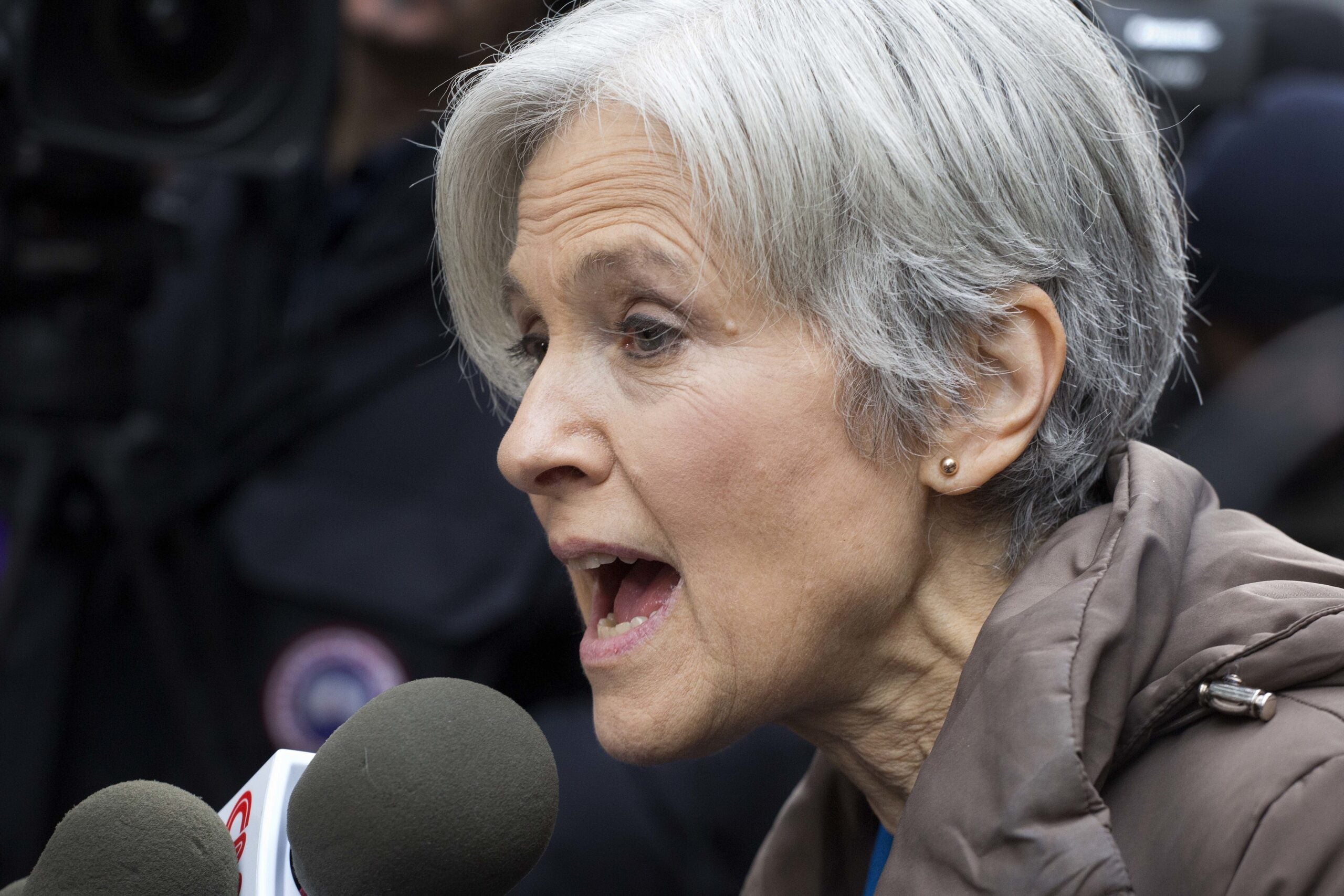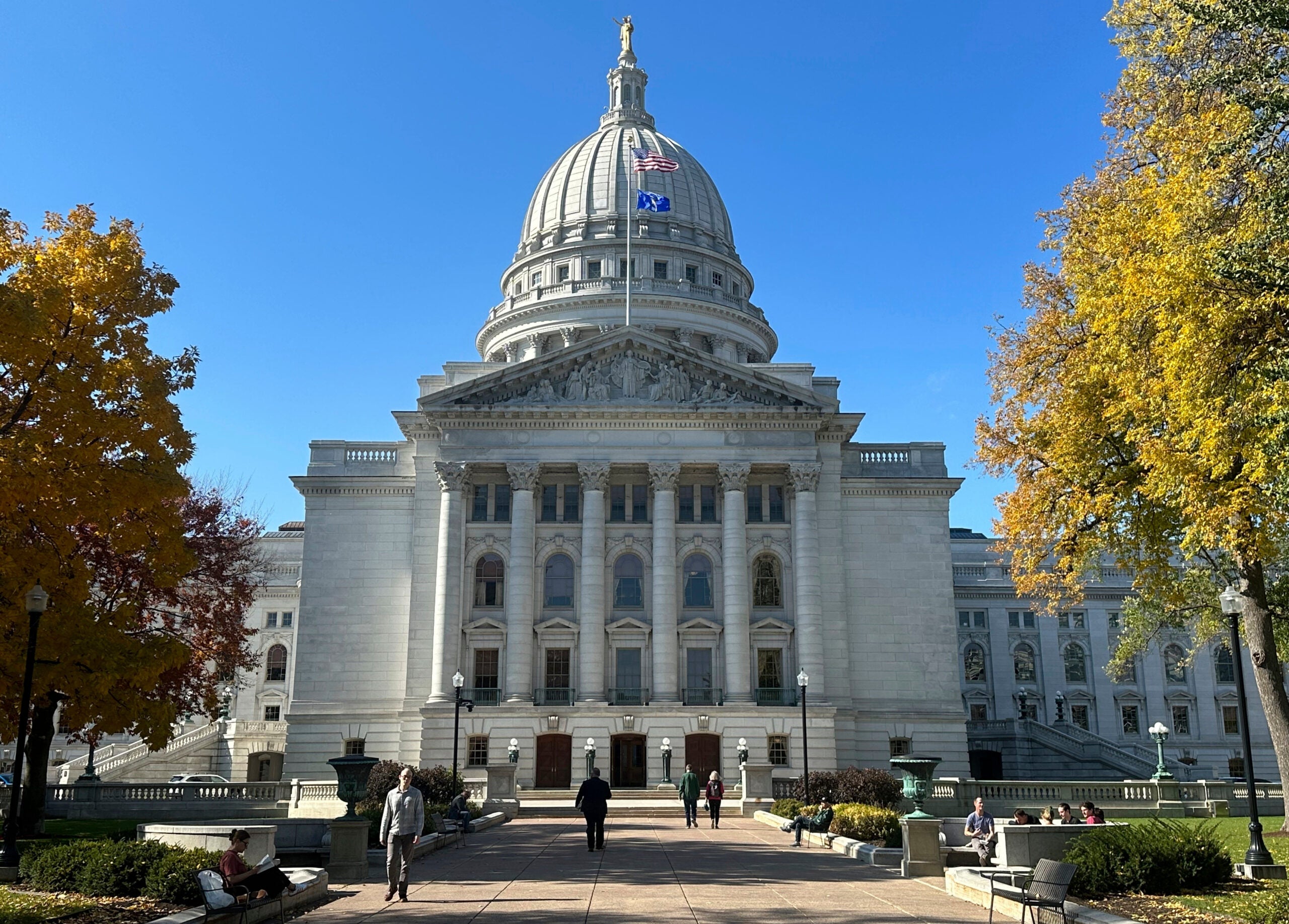The Wisconsin Supreme Court gave the state’s Green Party and the Wisconsin Elections Commission until 5 p.m. Friday to respond to a petition brought by the state’s Democratic Party.
The petition, originally filed on Monday, seeks to remove Green Party candidate Jill Stein from this year’s presidential ballot. Friday’s deadline takes the petition one step closer to the possibility of a decision from the state’s high court.
The Wisconsin Elections Commission granted the Green Party ballot access in February after the party received over 1 percent of the vote in a 2022 statewide election, the legal requirement spelled out in a state statute.
News with a little more humanity
WPR’s “Wisconsin Today” newsletter keeps you connected to the state you love without feeling overwhelmed. No paywall. No agenda. No corporate filter.
Democrats argue another state statute prevents Stein from legally appearing on the ballot because the Greens have no state officeholders or legislative candidates authorized to nominate presidential electors.
They want the court to reverse the Elections Commission’s decision before it meets to certify candidates next Tuesday.
Timing of court order controversial
In her dissent to the court order, Wisconsin Supreme Court Justice Rebecca Bradley wrote that, to her knowledge, “at no time in history has the court issued such orders before parties had made their appearances or retained lawyers.” Chief Justice Annette Ziegler joined Bradley’s dissent.
According to Michael J. White, co-chair of the Wisconsin Green Party, his party had no legal representation in Wisconsin when he was notified of the court order.
“That just strikes me as a little bit unreasonable,” he told WPR on Thursday afternoon.
Pete Karas, the state Green Party’s elections chair, said they found a lawyer “around midnight” after “a zillion phone calls.” That lawyer is Milwaukee-area attorney Michael Dean.
The next morning, the party sent out a mass email to its followers asking for donations.
“Lawyers are expensive, and we need your help today to ensure we can pay for these much-needed legal fees,” the mailer said.
In a statement to WPR, Adrienne Watson, who is a senior advisor to the Democratic National Committee, wrote that “the Green Party has already had a lawyer review and opine on this case, so statements claiming it has had inadequate time to retain counsel ring hollow.”
Watson did not clarify which lawyer she was referring to or when the review took place.
The order to file responses doesn’t necessarily mean the Supreme Court will take up the case before Tuesday, but Karas said he believes it’s a sign of the court’s plans.
“They went ahead and gave us 28 hours to file legal briefs, and I don’t believe that the justices on the court would’ve done that if they didn’t intend to hear the case,” Karas said.
The Wisconsin Elections Commission declined to provide a comment on the petition.
Conservative groups weigh in
The state Supreme Court’s order also included an invitation to file amicus briefs, documents used by non-parties to offer additional information or arguments to the case. That opportunity has been taken by the Wisconsin Institute for Law & Liberty, or WILL, a conservative legal center known for its activism on school vouchers. A WILL attorney is also representing two Green Party voters in the case.
In a press release, WILL President Rick Esenberg wrote that “a last-minute ruling, not based in law, from the Wisconsin Supreme Court in favor of the DNC would severely damage the faith and trust every day Wisconsinites put in their elections.”
On Friday afternoon, the Republican Party of Wisconsin filed a motion to intervene as a party in the case. In their memorandum in support of that motion, the party’s lawyers said the GOP plans to oppose the Democrats’ petition. They also asked the court’s permission to file an amicus brief in case their request to intervene was denied.
In the memorandum, the party’s lawyers argued that Democrats’ interpretation of Wisconsin Statute 8.18 would make that statute unconstitutional. They said it burdens political parties’ constitutional rights when layered on top of Wisconsin’s 1 percent ballot benchmark.
The Greens’ Pete Karas agreed, citing Supreme Court case U.S. Term Limits, Inc. v. Thornton.
“They’re using some definition in the statute that we do not agree with, and we also believe that the statute itself is unconstitutional,” Karas said.
“The Democratic Party, in this effort, appears to want to silence all dissenting voices in swing states and suppress any votes that are not in their favor,” Greens state co-chair White, said.
Third parties can tip the scale in Wisconsin elections
In 2016, Donald Trump beat Hillary Clinton by about 24,000 votes in Wisconsin. Four years later, Joe Biden beat Donald Trump by less than 21,000 votes.
The last time that Green Party candidate Jill Stein appeared on Wisconsin presidential ballots was 2016. She received over 31,000 votes, raising fears of third parties acting as “spoilers” in future elections by pulling votes from major parties.
Karas, who served as a Green Party alder in Racine in the 2000s, argues that third parties are essential to making progress in American politics.
He used the example of former Wisconsin governor Robert La Follette. Known as “Fightin’ Bob,” La Follette founded the Progressive Party in 1924, and was a key advocate of workers’ compensation and child labor laws in the 1920s.
“It’s really important that people are able to vote their conscience, and that even if we don’t win a presidential election, we can still affect change,” Karas said.
As of late Friday afternoon, Governor Tony Evers also motioned to file an amicus brief in the case.
The court released the responses of the Wisconsin Elections Commission and the Wisconsin Green Party on Friday evening.
The Commission agreed that the issue raised by the Democrats’ petition deserves a court hearing, but stated that it “takes no position on the merits of the petition.”
The Green Party’s response argued that Democrats’ interpretation of Wisconsin statute violates precedent in election law, and that the DNC misconstrued non-binding law to be binding. It said the Green Party properly nominated Stein and requested the court to dismiss the petition.
Wisconsin Public Radio, © Copyright 2025, Board of Regents of the University of Wisconsin System and Wisconsin Educational Communications Board.





